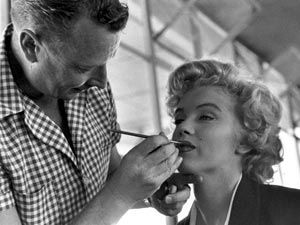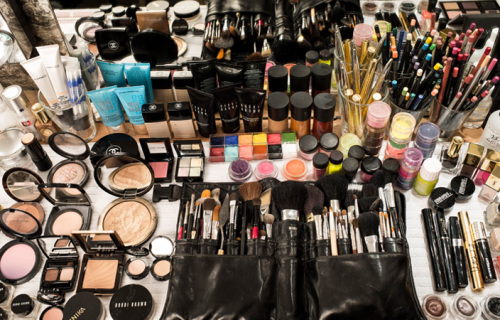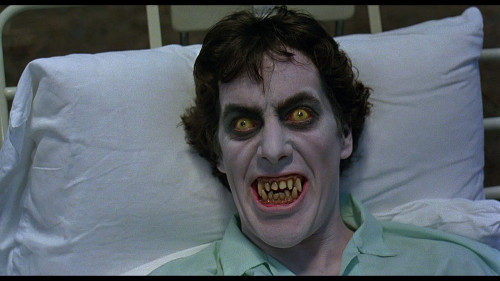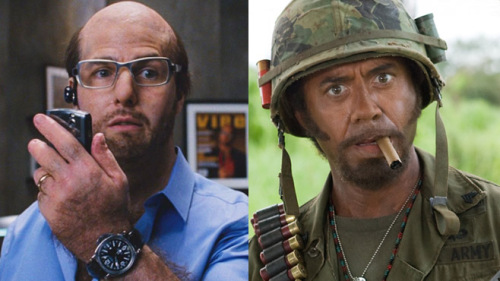THE DO’S AND DON’TS OF BECOMING A MAKEUP ARTIST FOR FILM BY DIVA DEL MAR
The Don’ts:
Don’t Quit Your Day Job
I know you’re talented, but like any career in the film/television industry, you are going to work for free in the beginning. That’s right: FREE. Your first few gigs will likely be amateur student films, with folks who have no idea what they are doing. More importantly, they will have no budget and absolutely no experience. You’ll work long-ass hours and be asked to do hair, lighting, and all sorts of other tasks that have nothing to do with make-up artistry. It can take well over a year before you find a production willing to pay you for your work. Most will give you a “kit allowance,” to cover the cost of your actual make-up, and that has to be negotiated up front.
Don’t Spend TONS of Money on Brand Name Make-up
Everybody thinks that M.A.C. brand is the ONLY brand to use when they first start. It’s not. It’s just a label and excellent marketing. There are literally hundreds of brands of make-up and a beginner has no business dropping loads of cash for a brand name kit. Remember that all cosmetics are made of crushed rocks and minerals in different combinations to create colors and textures. Don’t get caught up in the hype. Hit up the aesthetic trade-shows and beauty supply stores for better quality and way better prices. Build your kit wisely not lavishly. As you get more advanced with your skills, you’ll discover true performance brands, but they only sell to professionals with experience and a portfolio.
Don’t Give Up on Your Other Passions
Look, the chances are, you will fail in this career. You won’t fail because you suck at doing make-up, you’ll fail because you need to pay your bills and unfortunately, there are very few paying gigs out there and TONS of competition. This is one of those weird crafts where talent and experience aren’t appreciated until you get into much higher-end productions. Be open to letting make-up artistry become a hobby as you pursue another career.
Don’t Get Blacklisted
Oh, the terrible BLACKLIST!! In case you don’t know what the term “blacklisted” refers to, it means that a person or a production crew screws up so royally and/or repeatedly burns so many bridges that the general population in the film industry shuns them. How does a make-up artist get blacklisted? The most common and obvious way is to “walk” during filming, or to leave a film or television production before it’s wrapped for the day without permission. It’s a bad move, and it’s not easily forgiven or forgotten. Finish EVERY gig you start, be professional, do your job, don’t have relationships with the crew/actors, stay sober on set, and don’t be a hot mess to work with.
The Dos:
Do Go To School
Duh, right? Actually, a lot of make-up artists skip this step. So, just because your family and friends love it when you do their make-up, that doesn’t give you the fundamental understanding of lighting, media, continuity, history, and specialties of cosmetics. I invested in a professional make-up curriculum and it was one of the best investments I’ve ever made. The 8 week advanced make-up application course gave me an edge over other artists. I learned the difference between film, runway, stage, trans-formative, television, and photography make-up techniques. I learned how to work with different lighting choices, camera angles, and how to chart, execute, and organize a movie’s make-up plan character by character, scene by scene, by working with the script. So….duh, right?
Do Go To California
The best make-up schools and career opportunities for film are in California. Some of the schools there even guarantee job placement with graduation, and that is worth the move if you want to be a lifer. A few other areas to consider are New York for photography and theater work, and Vancouver, Canada for television work.
Do Network With Production Companies and Photographers
As with any entertainment related work, it’s important to know the right people. Production crews tend to like using the same people for all of their projects. Film crews, especially during the production stage of filmmaking, have to work well together to make the most out of every dollar. There has to be a similar work philosophy, so finding a crew that you gel with is key. It’s also important for you to work with various production companies. These businesses are high risk and you shouldn’t rely on just one crew to give you work. Photographers are another good resource for budding make-up artists. They’re usually loyal to one or two make-up artists that “get” their style and they can introduce you to actors.
Do Learn How to File Your Taxes
Seriously, talk to an accountant. You will be surprised what you can write off, but you have to file everything correctly. It’s important to stay on top of financial records because getting audited as an amateur free-lancer can turn into a nightmare from hell!
Do Create A Portfolio
Everytime you work a gig, or experiment with a new technique, snap a picture and log it into your portfolio. Create slideshows on YouTube and have demo reels, just like an actor. Ensure that you receive stills (photographs taken during film shooting) from every photographer on set and make sure that you have copies of your best work. I recommend having a digital formats as well as hard copies of your portfolio to hand to directors, producers, and assistant directors when interviewing for a film. It will help you stand out and also give you leverage to ask for what you are worth.
Do Learn Who’s Who on Set and Basic Production Etiquette: Usually you have to learn by hard knocks. During filming, a good make-up artist is always close at hand, but never standing in the light. You need to know who you report to, or whether or not you’re allowed to talk to the director during filming. It’s part of the industry and being ignorant of the basic rules can get your ass canned and blacklisted.
Do Explore, Experiment, and Play with Make-Up Between Gigs: I always think of those addictive nature shows that say, “Play amongst cubs is not just for fun, but important to learning survival skills needed as adults.” The same is true for make-up techniques. Practicing on yourself, friends, and even drawing out new looks on paper will help you improve your speed, accuracy, and detail when on set. Breaks between gigs are an excellent time to create new looks and diversifying your skills. Besides the practice, fooling around with your make-up is a great reminder as to why you chose make-up as a career. I find that fun, no pressure make-up sessions let me reflect on why I love my brushes so much. It reminds me that we are artists, in the truest sense, and our canvas is the human face.
Thanks for reading and good luck, newbies!!!




